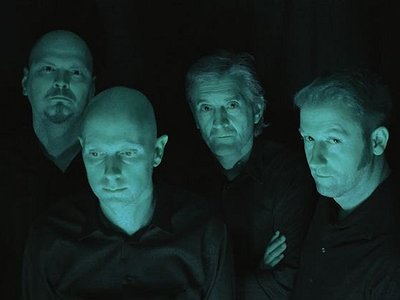Winning the bet
Christoph Clöser is known for his contribution to German doom-jazz heroes Bohren and der Club of Gore. Described by Morten Gass as "meeting a very cute girl who hands you a gin-arsenic tonic", Bohren's music conjures up scenarios so complete in mood and tone that it's like film music that needs no film. Dark without being heavy, Bohren's sound changed with Clöser's addition to the group in 1997. His sultry saxophone bought a jazz-oriented focus to the band's up until then, more doom-centric records. In 2011 Clöser joined Tycho Schottelius' Desmond Denker, Thomas Mahmoud and & Gerald Mand to form The Nest. Releasing their debut, Music for Drivers with Denovali in 2012, Clöser more thoroughly explored his experimental side in the improvisational blending of minimalist jazz and noise. Currently touring with Bohren and der Club of Gore, Clöser and his cohorts are set to release a new album, Piano Nights on PIAS records, 24th January.
When did you start writing/producing music - and what or who were your early passions and influences?
When I was about 8 years old, I was forced to learn classical piano and I hated it, I was interested in rock and jazz music. One day, just for the devilment, I claimed among my friends, that I had a saxophone. I didn’t want to commit social suicide and so as not to be seen as a big mouth I bought one. That was the beginning.
My first heroes and influences were The Nice (with Keith Emerson), Deep Purple, Slade, and the music of the Dutch free-jazz band Willem Breuker Kollektieff.
What do you personally consider to be the incisive moments in your artistic work and/or career?
The crucial moment - I studied music in Cologne and felt myself out of place. And then I saw an announcement on the notice board of the University - "Circus Orchestra looks for sax-player". I applied for the job and made a bet with myself: If you get the job, then you go on with music, if not, you change to something different. I got the job and things went on.
What are currently your main compositional- and production-challenges?
The new Bohren-Album. The major challenge for us is to remain true to our music on a high level, but not to copy or repeat ourselves.
What do you usually start with when working on a new piece?
Usually, we start with thinking about a cool title.
How strictly do you separate improvising and composing?
For me improvisation and composition are two sides of the same coin. In an ideal situation it starts with an improvisation and ends with a composition.
How do you see the relationship between sound, space and composition?
I don’t know exactly, what means "space" here, but in my eyes the successful relationship between the course of time and the run of events (what happens when, how, why) is the main criterion for a successful composition.
Do you feel it important that an audience is able to deduct the processes and ideas behind a work purely on the basis of the music? If so, how do you make them transparent?
Our music is transparent. Everyone who wants to, can follow the ideas and processes behind our music, but it is not important or necessary for us and it shouldn’t be for listeners, too.
We think, the listener should enjoy the music/concert and follow his inner cinema. We follow ours.
In how much, do you feel, are creative decisions shaped by cultural differences – and in how much, vice versa, is the perception of sound influenced by cultural differences?
Even though formally different life-worlds in different cultures approach each other - i.e. Internet, Globalization etc. - creative decisions are still characterised by cultural differences.
But over the years, we get the impression, that different cultural backgrounds don’t have an effect on the perception of music.






